Key Features of Women’s Reservation Bill
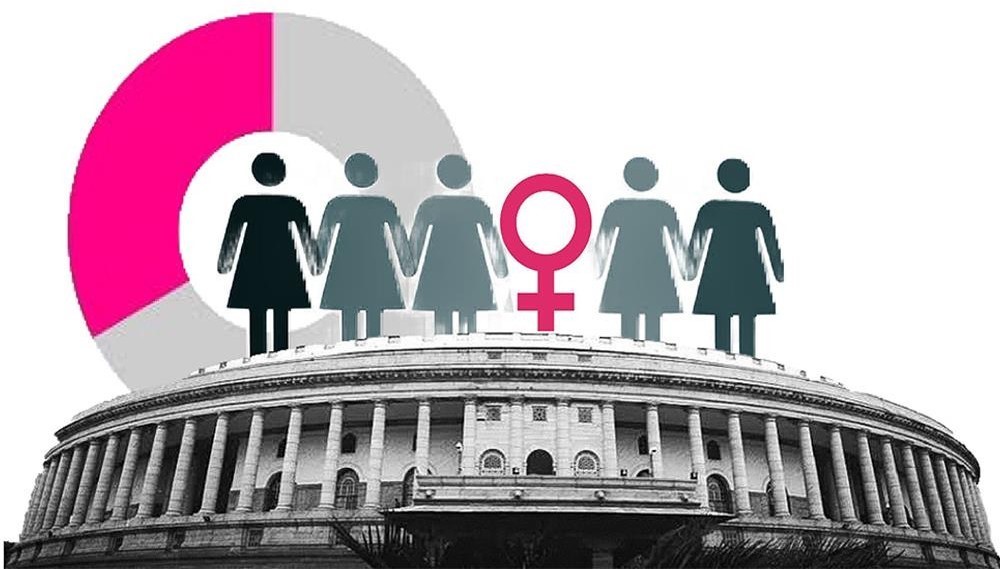
Context
- In the spotlight today is a crucial parliamentary session that commenced on Monday, featuring impassioned appeals from various political parties.
Key Details:
- This fervor was observed during the all-party meeting organized by the government ahead of the session, where strong support was voiced for the passage of the Women's Reservation Bill.
- Notably, the Women's Reservation Bill is not a new proposal but rather a decades-old issue.
- It has been presented in Parliament multiple times but has yet to be enacted, with its initial introduction dating back to September 12, 1996.
What exactly is the Women's Reservation Bill, and why is it of paramount importance?
- About: The Women's Reservation Bill is a legislative proposal embedded within the 85th Amendment to the Constitution.
- The Bill states that reserved seats shall be allotted by rotation after every delimitation exercise. This implies rotation approximately every 10 years as after 2026 delimitation is mandated to take place after every census.
- Aim: Its primary aim is to ensure that 33% of seats in both the Lok Sabha and State Legislative Assemblies are reserved for women.
- Within this 33%, one-third of the seats are further earmarked for Scheduled Castes and Scheduled Tribes women on a rotational basis.
Constitutional provision related to it:
- The 73rd and 74th Amendments passed in 1993, which introduced panchayats and municipalities in the Constitution, reserve one-third of seats for women in these bodies.
- The Constitution also provides for reservation of seats in Lok Sabha and state legislative assemblies for Scheduled Castes (SCs) and Scheduled Tribes (STs) in proportion to their number in the population.
- The Constitution does not provide for reservation of seats for women in the Lok Sabha and state legislative assemblies. Some members of the Constituent Assembly had opposed reserving seats for women in legislatures.
Key details and facts related to it:
- 15% of the total members of the 17th Lok Sabha are women while in state legislative assemblies, women on average constitute 9% of the total members.
- In 2015, the Report on the Status of Women in India noted that the representation of women in state assemblies and Parliament continues to be dismal.
- It noted that decision making positions in political parties have negligible presence of women.
- It recommended reserving at least 50% seats for women in local bodies, state legislative assemblies, Parliament, ministerial levels, and all decision-making bodies of the government.6
- The National Policy for the Empowerment of Women (2001) had stated that reservation will be considered in higher legislative bodies.
Background:
- Bills amending the Constitution to reserve seats for women in Parliament and state legislative assemblies have been introduced in 1996, 1998, 1999, and 2008.
- The first three Bills lapsed with dissolution of their respective Lok Sabhas. The 2008 Bill was introduced in and passed by Rajya Sabha but it also lapsed with the dissolution of the 14th Lok Sabha.
- The 1996 Bill had been examined by a Joint Committee of Parliament, while the 2008 Bill was examined by the Standing Committee on Personnel, Public Grievances, Law and Justice.
- Both Committees agreed with the proposal to reserve seats for women.
- Some of the recommendations given by the Committees include:
- (i) considering reservation for women belonging to other backward classes at an appropriate time,
- (ii) providing reservation for a period of 15 years and reviewing it thereafter, and
- (iii) working out the modalities to reserve seats for women in Rajya Sabha and state legislative councils.
| The Constitution (One Hundred and Twenty-Eighth Amendment) Bill, 2023 was introduced in Lok Sabha on September 19, 2023. The Bill seeks to reserve one-third of the total number of seats in Lok Sabha and state legislative assemblies for women. |
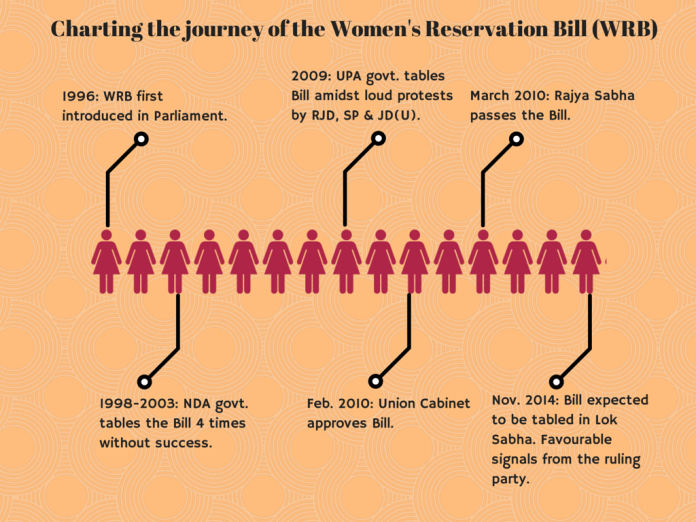
Key features of the Bill:
Reservation for women:
- The Bill reserves, as nearly as may be, one-third of all seats for women in Lok Sabha, state legislative assemblies, and the Legislative Assembly of the National Capital Territory of Delhi.
- This will also apply to the seats reserved for SCs and STs in Lok Sabha and states legislatures.
Commencement of reservation:
- The reservation will be effective after the census conducted after the commencement of this Bill has been published.
- Based on the census, delimitation will be undertaken to reserve seats for women.
- The reservation will be provided for a period of 15 years. However, it shall continue till such date as determined by a law made by Parliament.
Rotation of seats:
- Seats reserved for women will be rotated after each delimitation, as determined by a law made by Parliament.
Issues to consider:
- The issue of reservation of seats for women in legislatures can be examined from three perspectives:
- (i) whether the policy of reservation for women can act as an effective instrument for their empowerment,
- (ii) whether alternate methods of increasing representation of women in legislatures are feasible, and
- (iii) whether there are any issues with the proposed method for reservation in the Bill. The analysis in this section is largely based on our earlier Brief published on the 2008 Bill.
Purpose of reservation:
- If a group is not represented proportionately in the political system, its ability to influence policy-making is limited. The Convention on the Elimination of All Forms of Discrimination Against Women provides that discrimination against women must be eliminated in political and public life.
- While India is a signatory to the Convention, discrimination in matters of representation of women in decision-making bodies has continued.
| The number of women MPs has increased from 5% in the first Lok Sabha to 15% in the 17th Lok Sabha; but the number continues to be quite low. |
- A 2003 study about the effect of reservation for women in panchayats showed that women elected under the reservation policy invest more in the public goods closely linked to women’s concerns.
- The Standing Committee on Personnel, Public Grievances, Law and Justice (2009) had noted that reservation of seats for women in local bodies has enabled them to make meaningful contributions.
- It also noted that concerns regarding women being proxies to men in local bodies have turned out to be baseless. The Inter-Parliamentary Union (2022) has noted that legislated quotas have been a decisive factor in women’s representation.
Alternate methods of representation
- Reservation of one-third of seats for women in Parliament would restrict the choice of voters in the reserved constituencies.
- Two alternatives have been suggested by some experts: reservation for candidates within political parties; and dual member constituencies where some constituencies shall have two candidates, one being a woman.
- Initially, India had multi-member constituencies which included an SC/ST member. A 1961 Act converted all constituencies into single member constituencies.
- The reasoning was that the constituencies were too large and SC/ST members felt that they would gain in importance in single- member reserved constituencies.
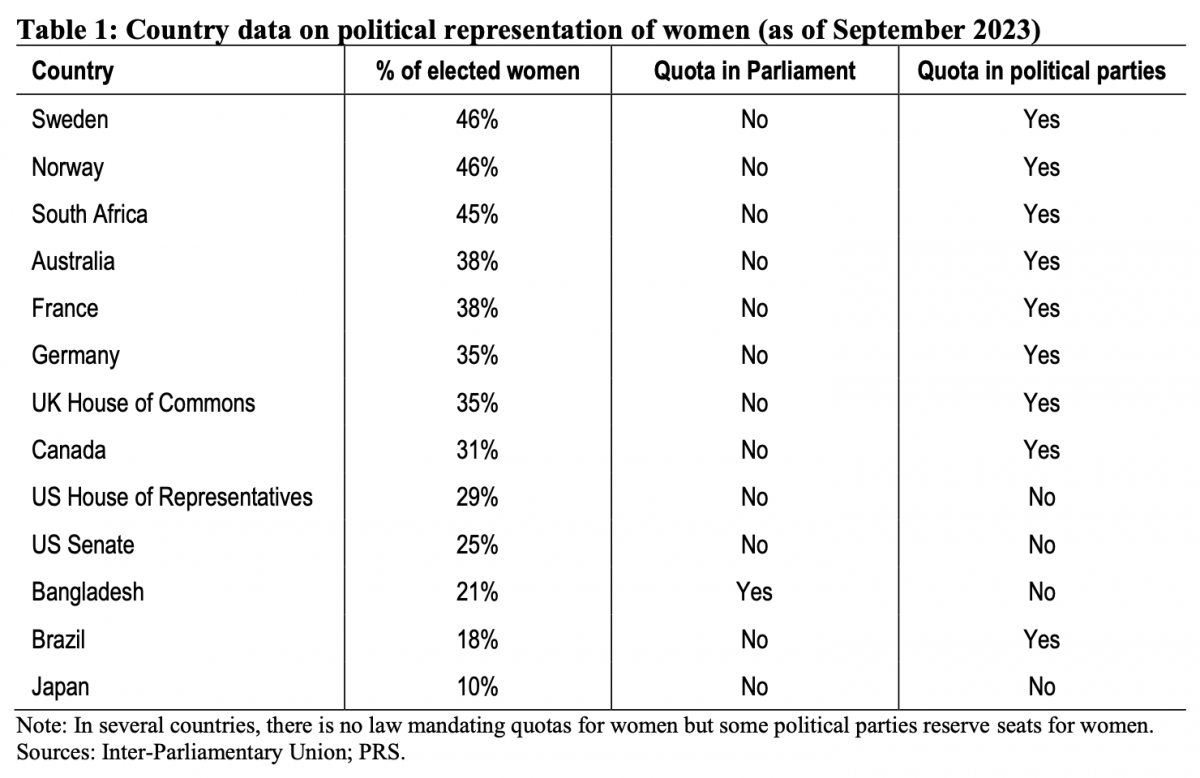
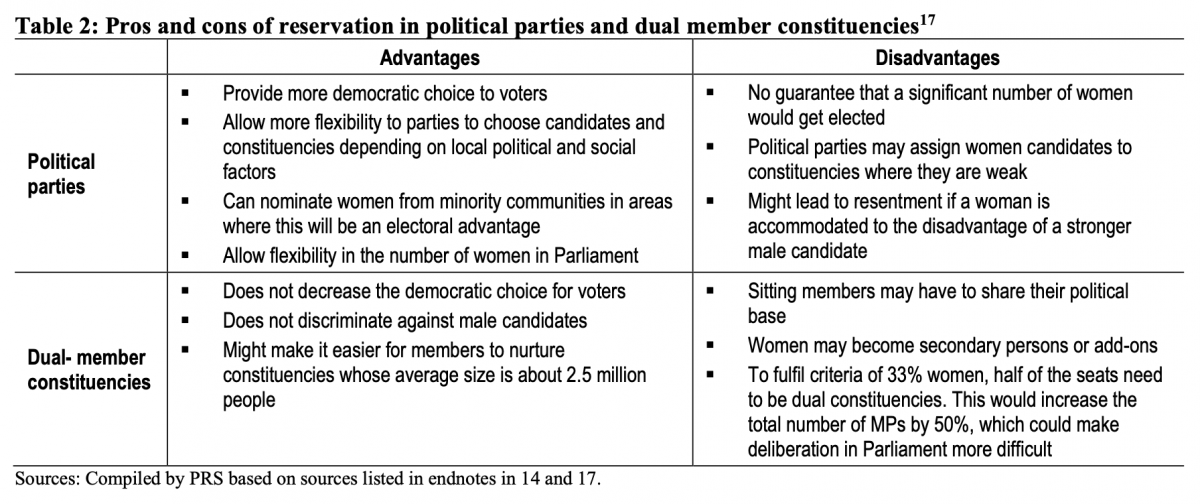
Rotating constituencies
- The Bill states that reserved seats shall be allotted by rotation after every delimitation exercise. This implies rotation approximately every 10 years as after 2026 delimitation is mandated to take place after every census.
- Rotation of reserved seats may reduce the incentive for MPs to work for their constituencies as they could be ineligible to seek re-election from that constituency.
- A study by the Ministry of Panchayati Raj recommended that rotation of constituencies should be discontinued at the panchayat level because almost 85% women were first-timers and only 15% women could get re-elected because the seats they were elected from were de-reserved.
Key changes between 2008 and 2023 Bills
- The table below captures certain key changes between the 2008 Bill as passed by Rajya Sabha and the Bill introduced in 2023.

https://www.outlookindia.com/national/what-are-the-key-details-of-women-s-reservation-bill-tabled-in-lok-sabha-read-full-text-news-319189
https://m.economictimes.com/news/india/women-reservation-bill-once-again-puts-spotlight-on-much-delayed-census-2021/articleshow/103791621.cms
https://thewire.in/government/womens-reservation-bill-the-issues-to-consider
https://newsonair.gov.in/Main-News-Details.aspx?id=468025#:~:text=Women%20celebrities%20and%20achievers%20who,ongoing%20special%20session%20of%20Parliament.
https://newsonair.gov.in/News?title=Women-celebrities-and-achievers-visit-Parliament%2C-hails-introduction-of-Women%E2%80%99s-Reservation-Bill&id=468021
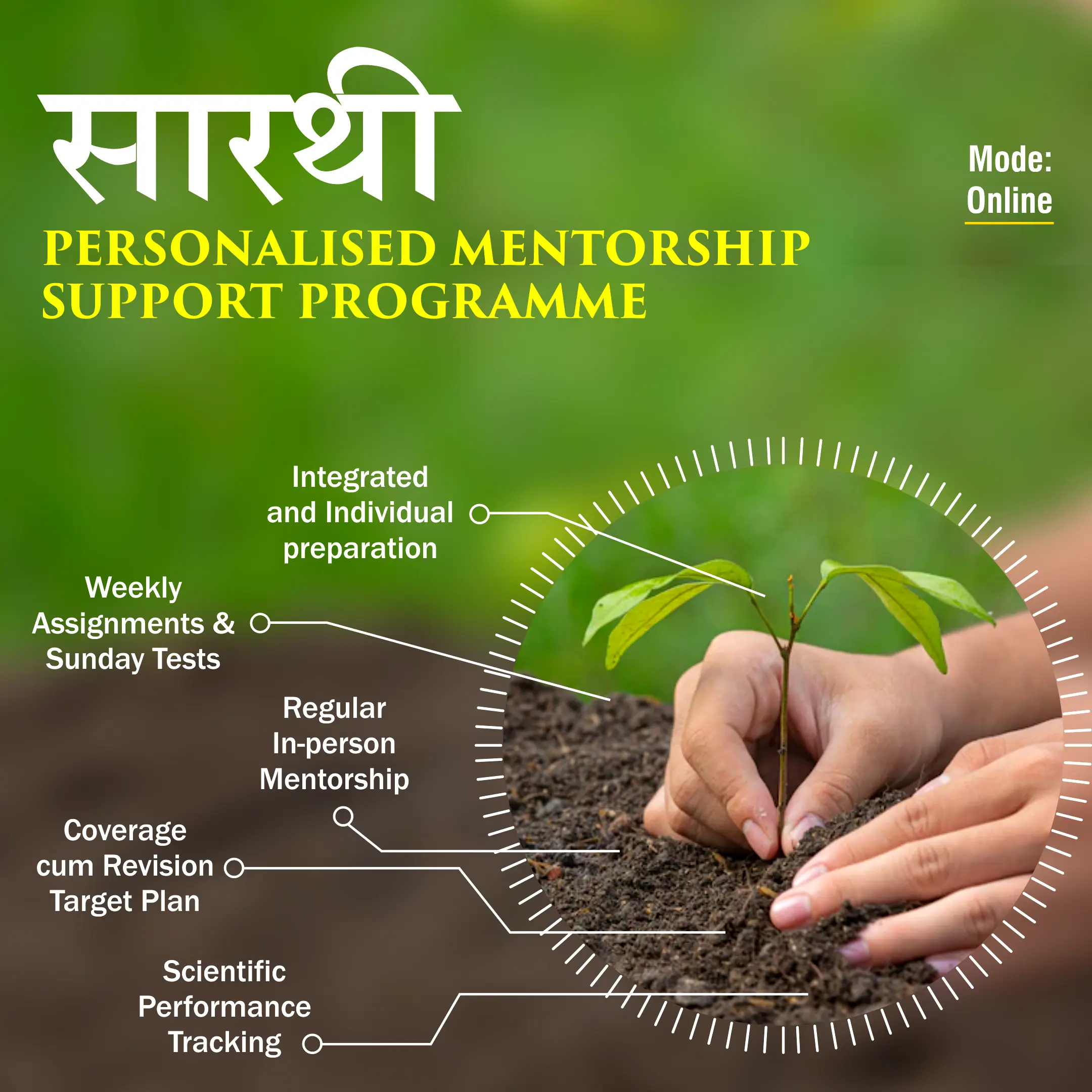
Festival of Nuakhai
Context
- President Droupadi Murmu greeted citizens on the festival of Nuakhai. In her greetings, the president wished for the prosperity of the country and its people.
Details
- The much-awaited day, Nuakahi, for the people of western Odisha districts, came today with much pomp and gaiety.
- The major agrarian festival of this region is being celebrated in every nook and corner collectively with much fanfare and religious fervour.
- People offer the newly harvested Nabanha crop to their respective presiding deities at a stipulated moment this morning.
- While Goddess Samaleswari is being worshipped in Sambalpur, Pateneswari in Bolangiri, Sureshwari in Sonepur, Sekharbasini in Sundargarh and Manikeswari in Kalahandi are offered the new crop.
- After providing the Nabanha, people relish different delicacies prepared from the newly harvested crop.
About Nuakhai:
- Nuakhai is a festival celebrated in the western districts of Odisha where the first produce of the field is offered to the goddess and people seek the blessings of elders in each household.
- The festival is mostly celebrated in Sambalpur, Bargarh, Jharsuguda, Bolangir, Kalahandi, Nuapada, Nabarangpur, Deogarh, and Sundergarh.
Significance:
- The Nuakhai Juhar is a significant ritual of the festival. It is an exchange of greetings with friends, relatives, and well-wishers.
- The elders are wished Nuakhai Juhar and they give blessings for long life, happiness and prosperity.
- Being an agrarian festival, the eldest in each household in rural pockets worshipped their paddy fields, praying for a bumper crop and favourable weather.
- Women folk leave bed early to perform the Nukhai rituals by decorating the house with colourful rangoli.
https://newsonair.gov.in/News?title=President-Droupadi-Murmu-greets-citizens-on-the-festival-of-Nuakhai&id=468028
.jpg)
Business Advisory Committee
Context
- Rajya Sabha Chairman Jagdeep Dhankhar today chaired a meeting of the Business Advisory Committee of Rajya Sabha in Parliament House.
Details:
- The meeting was attended by Deputy Chairman Harivansh, Leader of the House Piyush Goyal, Environment, Forest and Climate Change Minister Bhupendra Yadav, Congress MP Jairam Ramesh, Trinamool Congress MP Derek O Brien and other party leaders.
About Business Advisory Committee:
- The Business Advisory Committee (BAC) of Lok Sabha is a parliamentary committee in India that plays a vital role in the functioning and scheduling of the Lok Sabha, the lower house of the Indian Parliament.
- Aims and objectives: The primary aim of the BAC is to recommend and schedule the legislative and non-legislative business to be taken up in the Lok Sabha during its sessions. This includes prioritizing bills, motions, debates, and other parliamentary activities.
- Functions:
- The BAC decides the order in which various parliamentary activities will be taken up, including the introduction of bills, discussions on important issues, question hour, and other matters.
- It allocates time slots for debates, discussions, and other parliamentary business, ensuring that all parties and members have an opportunity to participate.
- It coordinates with various parliamentary committees and members to gather input and suggestions on the allocation of time and priorities for legislative and non-legislative business.
https://newsonair.gov.in/News?title=RS-Chairman-Jagdeep-Dhankhar-chairs-meeting-of-Business-Advisory-Committee-in-Parliament-House&id=468050
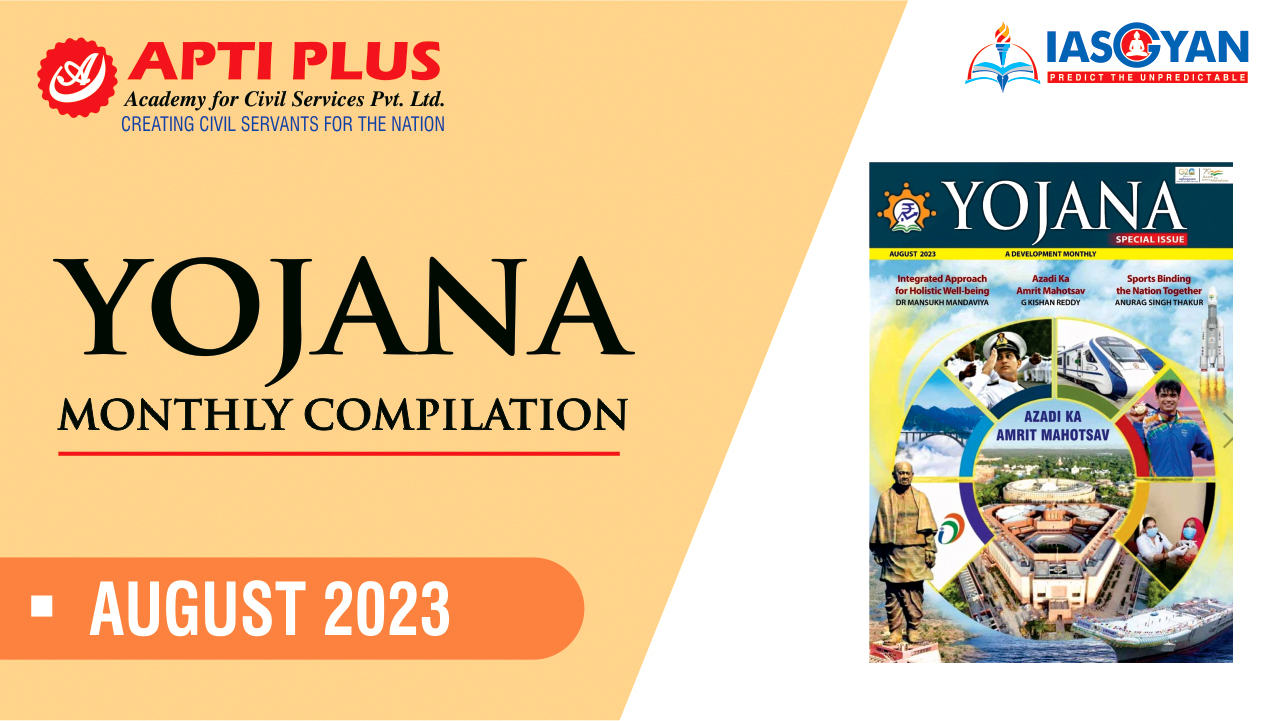
13th Indo-Pacific Armies Chiefs Conference (IPACC)
Context
- The 13th Indo-Pacific Armies Chiefs Conference (IPACC) will be held from 26 to 27 of this month at Manekshaw Centre, in New Delhi.
Details
- The two-day conference will be attended by army chiefs of the 30 Indo-Pacific region to discuss security cooperation, and collective strategies in the Indo-Pacific region.
- The conference will also discuss the issues of mutual interest in the region and the role of military diplomacy in mitigating the crisis in the region.
- This will be the 13th biennial event which will be hosted by the Indian Army and US Army Pacific.
About Indo-Pacific Armies Chiefs Conference (IPACC):
|
About
|
- It is a multilateral forum that brings together the chiefs of armies from countries in the Indo-Pacific region.
- IPACC serves as a platform for military leaders to engage in discussions, exchanges of information, and cooperation on various security and defense-related matters.
|
|
Purpose
|
- The conference aims to enhance regional security, promote mutual understanding, and foster collaboration among the participating nations.
|
|
Information Sharing
|
- Military leaders at IPACC share information on defense strategies, capabilities, and best practices.
- This information exchange helps build trust and enables countries to better understand each other's military capabilities and intentions.
|
|
Regional Stability and Prosperity
|
- IPACC acknowledges the importance of a stable and prosperous Indo-Pacific region, recognizing that security is closely linked to economic development and cooperation.
|
https://newsonair.gov.in/News?title=13th-Indo-Pacific-Armies-Chiefs-Conference-(IPACC)-to-be-held-from-26-to-27-of-Sept-in-New-Delhi&id=468037

UN Security Council to address modern challenges
Context
- The UN Secretary-General Antonio Guterres has called for major reforms in global institutions, including UN Security Council, to be able to address modern challenges.
Details:
- In his inaugural speech of the 78th session of the United Nations General Assembly debates, Mr. Guterres urged redesigning international financial architecture, so that it becomes truly universal and serves as a global safety net for developing countries in trouble.
- Guterres has also called for urgent action to combat climate change, including providing resources to developing countries to establish green energy sources.
About the UN Security Council:
|
About
|
- It is one of the six principal organs of the United Nations (UN) and is charged with ensuring international peace and security, recommending the admission of new UN members to the General Assembly, and approving any changes to the UN Charter.
- The UNSC is the only UN body with the authority to issue binding resolutions on member states.
|
|
Composition
|
- 15 members, including five permanent member states - China, France, Russian Federation, the United States, and the United Kingdom - and
- 10 non-permanent member states elected by the United Nations General Assembly (UNGA).
|
|
Veto power
|
- The UN defines 'veto' as a "special voting power", which provides that "if any one of the five permanent members cast a negative vote in (UNSC), the resolution or decision would not be approved".
- However, the "veto power" is restricted to P5 member states of the UN Security Council. Non-permanent members of the UNSC do not enjoy this privilege.
|
|
Powers of Presidency
|
- The presidency derives responsibility from the Provisional Rules of Procedure of the United Nations Security Councilas well as UNSC's practice.
- The holder of the presidency is considered to be the 'face' and spokesperson of the UNSC.
|
https://newsonair.gov.in/News?title=UN-chief-calls-for-major-reforms-in-global-institutions%2c-including-UN-Security-Council-to-address-modern-challenges&id=468012








